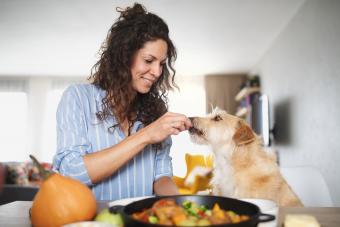
Dogs are naturally omnivores, just like us, so they need a combination of meat and plant-based food sources. Whole grains are a great source of complex carbs to give your pup the energy they need to keep moving throughout the day, but not all grains are created equal. Look for whole grains like oats and bulgur over starchy grains like corn, and consider a grain-free diet if your dog is allergic to grains.
Which Grains Are Good for Dogs?
There's considerable debate on whether dogs should eat grain at all, and the debate over "grain-free" dog foods rages on, so consult your veterinarian if you aren't sure about a particular dietary choice for your pet. That said, most dogs can eat a wide range of different grains. Of course, they should always be cooked before feeding to make sure they're digestible. Some of the healthiest grains dogs can eat include:
- Whole wheat
- Oats
- Barley
- Quinoa
- Brown rice
- Wild rice
- Millet
- Bulgur
- Sorghum
- Corn
Look for dog foods that contain whole grains. You should see the term "whole" before the grain listed in the ingredients. Avoid terms like "middlings" or "mill run."
How Much Can They Eat?
Even though grains contain a lot of beneficial nutrients like fiber, vitamins, and minerals, they shouldn't make up the bulk of your dog's diet. High-carb diets or foods packed with simple carbohydrates can lead to weight gain and obesity if the dog isn't active enough to use all the energy (and they'd probably have to be a professional athlete to do that). Your dog's diet should be no more than 20 percent carbohydrates, including grains.
The Grain-Free Diet Debate
If you feel like you're experiencing whiplash with all the information around the grain-free diet debate, you're not alone. Here's the deal: in 2018, the FDA announced a possible link between dilated cardiomyopathy (DCM) - which affects the heart's ability to pump blood and oxygen - in dogs who ate a grain-free diet.
Some veterinarians suggest it isn't necessarily the lack of grains that caused the heart problems, but the presence of starches, such as pulses (also known as legumes, namely peas) and potatoes that were included in the food in lieu of grains.
Do Grains Cause Allergies?
Similarly, some people believe that diets containing grains cause more allergic reactions in dogs. You're probably also aware of the gluten-free trend in human foods, and this probably contributes to the generalized concerns over feeding grains to dogs.
Yes, grains can trigger allergic reactions in dogs, just like in humans. Are they the leading cause, though? Probably not. The top five foods that lead to allergies in dogs are beef, dairy, chicken, wheat, and egg. As this study confirmed, protein sources in dog foods are far more likely to trigger allergies than grains, despite consumer perceptions around grain-free diets.
That doesn't mean grains can't cause allergies in your dog, however. It just means it might be hard to tell what your dog is reacting to in a commercial diet.
How to Tell If Your Dog Isn't Tolerating Grains
Dogs can definitely experience food allergies, and grains might be the source of their problems. If your dog is grain intolerant, you'll notice these signs:
- Itching
- Red skin
- Licking their paws
- Ear infections
- Diarrhea
- Vomiting
If your dog is truly allergic to grains, a grain-free diet may be right for them.
To Grain or Not to Grain?
If you choose to feed your dog grains, try to pick whole grains. And if you're worried that your dog may be allergic to grains, you can execute an elimination diet to see how they do without the grain. Just know these food trials take a lot of time and patience to know if they're working. Talk to your veterinarian for personalized food recommendations to find the right diet for your dog, whether or not it contains grains.







